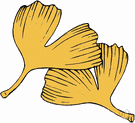ginkgo
(redirected from gingkoes)Also found in: Thesaurus, Medical, Encyclopedia.
Related to gingkoes: ginkgoes
gink·go
also ging·ko (gĭng′kō)n. pl. gink·goes also ging·koes
A deciduous, dioecious tree (Ginkgo biloba) native to China and having fan-shaped leaves used in herbal medicine. The female plants bear foul-smelling fleshy fruitlike structures containing edible seeds used in East Asian cuisine, while the male plants are often grown as ornamental street trees. Also called maidenhair tree.
[Probably from ginkyō (with graphic confusion of a romanized form of this word leading to the spelling with -kg- in European languages) : Japanese gin, silver (from Middle Chinese ŋin, ultimately from Proto-Sino-Tibetan *ŋul; akin to Tibetan dngul and Burmese ngwe) + Japanese kyō, apricot, any of several members of the genus Prunus (from Middle Chinese xɦa⋮jŋ`, also the source of Mandarin xìng).]
Word History: The odd spelling of the word ginkgo, which hardly indicates the usual pronunciation (gĭng′kō) very well, results from a botanist's error. In Japanese, the name of the ginkgo tree is written with kanji that can be read as ginkyō. The kanji that is pronounced gin literally means "silver," while the kanji pronounced kyō refers to several fruit-bearing trees of the genus Prunus, including the apricot. The kanji thus make reference to the green fruitlike structures that are borne by the female trees and contain a hard white inner seed covering similar to an apricot pit or pistachio shell. In Modern Japanese, however, these kanji are not read ginkyō but rather ginnan when they refer to the edible seeds and ichō when they refer to the tree itself. This complicated situation helps explain how the name of the tree came to be spelled ginkgo in European languages. The first Western scientist to learn of the existence of the ginkgo tree was Engelbert Kaempfer (1651-1716), a German physician and naturalist who visited Japan in 1691 and brought some seeds of the ginkgo back to Europe. During his stay in Japan, he also took notes on a Japanese work on botany and added comments on how to pronounce the names of the plants written in kanji. While taking these notes, Kaempfer apparently made a mistake and jotted down that the kanji literally meaning "silver apricot" were to be pronounced ginkgo. Later, he used these notes to prepare a book on the plants of Japan, and his mistake found its way into print. The great Swedish botanist Carolus Linnaeus perpetuated the error when assigning the scientific name Ginkgo biloba ("the two-lobed ginkgo") to the tree, and the spelling has been fixed ever since.
American Heritage® Dictionary of the English Language, Fifth Edition. Copyright © 2016 by Houghton Mifflin Harcourt Publishing Company. Published by Houghton Mifflin Harcourt Publishing Company. All rights reserved.
ginkgo
(ˈɡɪŋkɡəʊ) orgingko
n, pl -goes or -koes
(Plants) a widely planted ornamental Chinese gymnosperm tree, Ginkgo biloba, with fan-shaped deciduous leaves and fleshy yellow fruit: phylum Ginkgophyta. It is used in herbal remedies and as a food supplement. Also called: maidenhair tree
[C18: from Japanese ginkyō, from Ancient Chinese yin silver + hang apricot]
Collins English Dictionary – Complete and Unabridged, 12th Edition 2014 © HarperCollins Publishers 1991, 1994, 1998, 2000, 2003, 2006, 2007, 2009, 2011, 2014
gink•go
or ging•ko
(ˈgɪŋ koʊ, ˈdʒɪŋ-)n., pl. -goes or -koes.
a cultivated shade tree, Ginkgo biloba, native to China, having fan-shaped leaves and fleshy seeds with edible kernels: the sole surviving member of the gymnosperm class Ginkgoatae.
[1765–75; < New Latin representation of Japanese ginkyō=gin silver (< Chinese) + kyō apricot (< Chinese)]
Random House Kernerman Webster's College Dictionary, © 2010 K Dictionaries Ltd. Copyright 2005, 1997, 1991 by Random House, Inc. All rights reserved.
gink·go
(gĭng′kō) A deciduous tree originally native to China, having fan-shaped leaves and fleshy yellow seeds. Ginkgoes are gymnosperms and do not have flowers.
The American Heritage® Student Science Dictionary, Second Edition. Copyright © 2014 by Houghton Mifflin Harcourt Publishing Company. Published by Houghton Mifflin Harcourt Publishing Company. All rights reserved.
ThesaurusAntonymsRelated WordsSynonymsLegend:
Switch to new thesaurus
| Noun | 1. |  ginkgo - deciduous dioecious Chinese tree having fan-shaped leaves and fleshy yellow seeds; exists almost exclusively in cultivation especially as an ornamental street tree ginkgo - deciduous dioecious Chinese tree having fan-shaped leaves and fleshy yellow seeds; exists almost exclusively in cultivation especially as an ornamental street treegymnospermous tree - any tree of the division Gymnospermophyta |
Based on WordNet 3.0, Farlex clipart collection. © 2003-2012 Princeton University, Farlex Inc.
